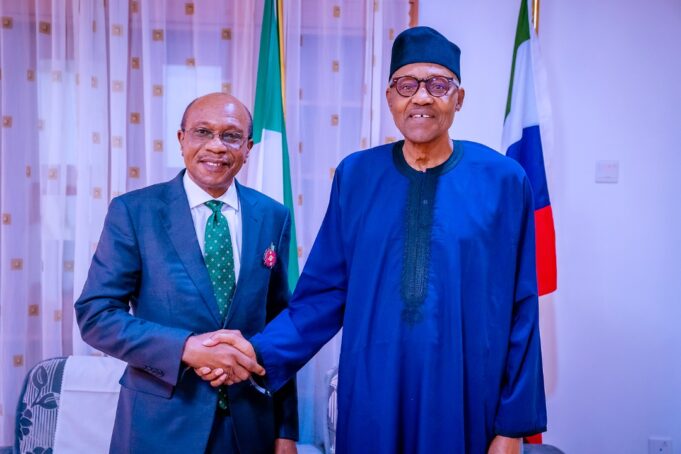An EFCC witness, Bamaiyi Mairiga, on Thursday, March 7, 2024 told an FCT high court, Maitama that the signatures of former President Muhammadu Buhari and the immediate past Secretary to the Government of the Federation (SGF), Boss Mustapha, were forged.
Mairiga, a forensic document examiner with the EFCC, said this while testifying in the ongoing trial of the former governor of the Central Bank of Nigeria (CBN), Godwin Emefiele, before Justice Hamza Muazu.
Emefiele is charged with an amended 20-count charge bordering on conferment of corrupt advantage, forgery, criminal breach of trust, conspiracy to obtain by false pretence and obtaining money by false pretence.
The sacked CBN governor is accused in the charge of forging a document titled: “Re: Presidential Directive on Foreign Election Observer Missions” dated 26 January, 2023 with Ref No. SGF.43/L.01/201 and purported same to have emanated from the office of the SGF to the CBN Governor.
He is further alleged to have, on February 8, 2023 knowingly obtained, by false pretence, $6,230,000 by falsely representing that the SGF via a letter dated 26 January, 2023 with Ref No. SGF 43/L.01/201 requested the CBN to provide a contingent logistic advance in the sum of $6,230,000 “in line with President’s directive”.
He, however, pleaded not guilty to the charge preferred against him.
Emefiele’s trial: Why I paid $6.23m cash for foreign election observers – CBN official
Testifying as the sixth prosecution witness (PW6), Mairiga told the court that the forensic department of EFCC received a request for the examination of some signatures that were forwarded to the department.
Led in evidence by the prosecution counsel, Rotimi Oyedepo (SAN), the witness told the court that as an expert, he knew as a fact that no two writers shared identical handwriting characteristics.
He added that two writers could not produce their writing exactly and no writer could exceed their skill level.
According to the PW6, “With this in mind, the signatures were examined for presence of life quality, slants, alignment, diacritical placement, pen movement, skill of execution and comparisons of class and individual characteristics against the specimen signatures.”
Mairiga told the court that both the disputed and specimen signatures were analysed to identify individual characteristics present or absent in each of the signatures.
The witness added that a comparison of the identified individual characteristics in both the disputed and specimen signatures were compared to establish similarities and dissimilarities.
“To verify the entire process, further analysis was carried out using further methodology and a peer review by another expert so as to validate it in terms of reproductibility.
“The conclusion from the analysis revealed that the disputed document showed evidence of forgery and copy act,” Mairiga told the court.
He said it was found out that the skill of execution was discovered to be different from that of the specimen signatures.
The witness added that, “Specifically, the disputed signature and the specimen signatures were found to be different in respect of pen movement, skill of execution, loop formation. There was individual characteristic.
“This is a confirmation that the author of the specimen signature did not write the signature of Muhammadu Buhari on the disputed document.”
According to him, same analysis process led to the conclusion that, “the author of the specimen signature did not write the signature of Boss Mustapha on the disputed document.”
Mairiga added that the process was reduced to a report, which was tendered as an exhibit before the court.
Without any objection from the defence, the report was admitted and marked a second Exhibit FDE.
Meanwhile, Justice Muazu adjourned the continuation of hearing until March 11.
- Getting BRACED states out of the doldrums - January 1, 2025
- Tinubu denies fighting governors, calls for collaboration - January 1, 2025
- Adeboye declares 2025 ‘A Landmark Year’, speaks on prophecies - January 1, 2025










